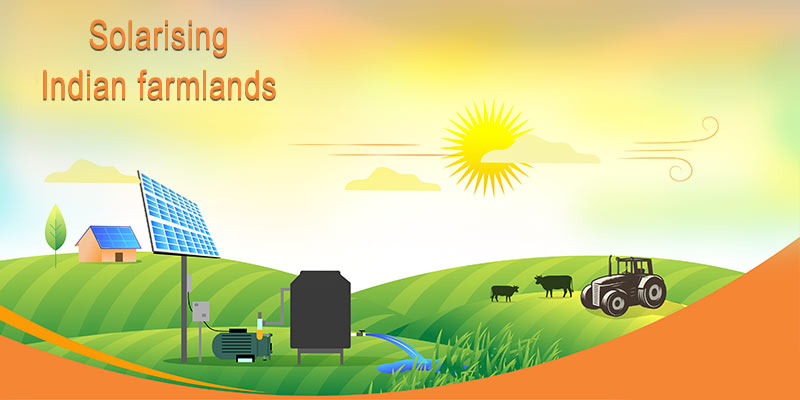- India
- Nov 14
- Mathew Gregory
Govt expands scope of PM-KUSUM scheme
Ministry of New and Renewable Energy (MNRE) has amended/clarified implementation Guidelines of Pradhan Mantri Kisan Urja Suraksha evam Utthaan Mahabhiyaan (PM-KUSUM) scheme based on the learnings from the implementation of the Scheme during the first year.
The Scheme consists of three components
A. Component-A includes installation of Decentralized Ground Mounted Grid Connected Renewable Power Plants
B. Component-B includes installation of standalone Solar Powered Agriculture Pumps
C. Component-C includes Solarisation of Grid-connected Agriculture Pumps
Amendments for Component-A
• Besides barren, fallow and agricultural land, solar power plants can also be installed on pasture land and marshy land of farmers.
• To support small farmers, the solar power projects smaller than 500 kW may be allowed by States based on techno-commercial feasibility.
• The Selected Renewable Power Generator (RPG) shall commission the solar power plant within twelve months from date of issuance of Letter of Award (LoA).
• There shall be no penalty to RPG for shortfall in solar power generation from minimum prescribed Capacity Utilization Factor (CUF).
Amendments for Component-B
• MNRE will retain 33% of eligible service charges for nation-wide Information, Education and Communication (IEC) activities.
• For solar pumps to be set up and used by Water User Associations (WUA)/Farmer Producer Organisations (FPO)/Primary Agriculture Credit Societies (PACS) or for cluster based irrigation system, the CFA will be allowed for solar pump capacity of higher than 7.5 HP considering upto 5 HP capacity for each individual in the group.
• Eligibility for participation in the centralised tender has also been amended allowing joint venture of manufacturer of solar pump/solar panel/solar pump controller with local integrators.
• To bring seriousness and competition in the bid, quantity equivalent to 10% of total quantity (rounded off to nearest whole number) under the particular category/type of pumps of a cluster will be allocated to L1 bidder and balance will be kept on market mode for all selected bidders including L1 bidder.
• Guidelines related to Specifications and testing have also been amended to avoid repetitive testing of same model and faster implementation.
• Now it has been decided that the test certificate already available for a solar pumping system can be used for other installers provided the user obtains written consent from the owner of test certificate to use the same.
• As part of amended guidelines separate bid price for solar water pumping system with Universal Solar Pump Controller (USPC) will be invited and subsidy will be made available for these pumps.
• Standalone solar pumps are used only for 100-150 days in a year and solar energy generated during balance period is not utilised.
• In order to make effective use of solar energy it was proposed to introduce USPC, which will not only run the water pump but can also run other electric equipment cold storage, battery charging, flour mill, etc.
• Installation of USPC will increase the income of farmer, which is the aim of the PM-KUSUM Scheme.
Amendments for Component-C
• As part of Component-C Ministry will also use 33% of service charges for IEC activities.
• The provision has been made for advance release of Service charges to implementing agencies for preparatory activities.
• Under Component-C, individual farmers having grid connected agriculture pumps are being supported to solarise their pumps.
• Farmers will be provided solar panels and they will be able to use the generated solar power to meet the irrigation needs and sell the surplus solar power.
• DISCOMs will buy surplus power from them at the per-determined rate to be decided by the respective State/SERC.
• Solar PV capacity up to two times of pump capacity in kW is allowed under the scheme.
(The author is a trainer for Civil Services aspirants. The views expressed here are personal.)

